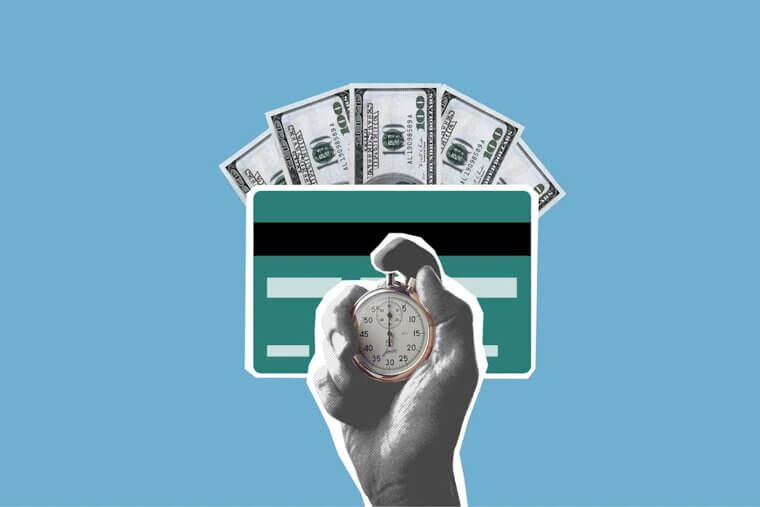Retiring With High-Interest Credit Card Debt
Retiring with high-interest credit card debt can quickly turn your golden years into a stress test. Interest compounds fast, making even small balances balloon over time. Paying it off first isn’t glamorous, but it’s the best way to ensure your retirement feels relaxing.
Delaying Debt Payoff
Carrying loans into retirement can be financially crippling, especially since your fixed income is not equipped to handle essential spending and hefty debt service. The longer you wait, the less flexible your budget becomes.
Overspending on Credit Cards
If you’ve spent your lifetime swiping without a second thought, it will catch up fast in retirement. Many retirees admit they lacked the spending discipline necessary to avoid running up large credit card tabs over the decades. All those little purchases add up…
High monthly payments are only half the story…
High monthly payments are only half the story…
Carrying a Mortgage Into Retirement
The dream of burning that mortgage in a celebratory bonfire is real, isn’t it? Unfortunately, retirees often regret not aggressively tackling their mortgage in their peak earning years. It is better to take care of it now than be trapped in a home you own but can't afford to live in.
Using Debt to Fund Lifestyle
Using debt to maintain a certain lifestyle might feel good in the moment, but it can come back to bite you in your later years. Many retirees regret using credit cards to fund vacations, dine out at expensive restaurants, and purchase luxury products.
Overcommitting to Car Loans/Leases
Retirees always cringe when they think about all those years they upgraded vehicles they didn't need. A reliable used car does the same job. That doesn’t mean you have to drive a 30-year-old pile of scrap; you just need to find a sweet spot between cost and value.
Even medical emergencies can turn regretful…
Even medical emergencies can turn regretful…
Incurring Medical Debt
Nobody plans for their body to betray them, but one hospital visit or unexpected procedure can leave you dealing with debt instead of enjoying peace of mind. One ambulance ride shouldn't cost more than a used car, but here we are.
Taking on Debt to Help Adult Children / Grandchildren
Love can make us do wild things, like co-signing loans or maxing out credit cards to help the kids. You can't pour from an empty cup, and you definitely can't retire peacefully while drowning in someone else's debt. Help when you can, but not at the expense of your future.
Not Following a Strict Budget
Winging it with money works great until suddenly it doesn't. Many retirees wish they'd actually tracked where their dollars went instead of just hoping things would work out. Plus, financial panic at 65 is not a good look. Better plan ahead while you still can!
Think a lack of budget is bad? You haven’t seen anything yet.
Think a lack of budget is bad? You haven’t seen anything yet.
Misusing Home Equity (HELOCs / Reverse Mortgages)
Your home equity isn't a magic ATM, even though banks love to make you feel that way. Do not tap into your home equity for non-essential consumption or to pay off other debts, especially late in life. This can jeopardize the security of your most valuable asset and leave your heirs with a rather small, debt-encumbered inheritance.
Failing to Lower Interest / Consolidate Debt
If you pay whatever interest rate the bank slaps on you, just know you're being taken advantage of. Most people regret never making that awkward phone call to ask for lower rates. Make that call. A few uncomfortable conversations could save you thousands!
Buying Too Expensive a Home
That dream house with a chef's kitchen and extra bedrooms seems perfect. But how about buying something modest early on instead of stretching their budget to impress nobody in particular? You don’t really need those six bedrooms…
You think overpaying for a house is costly? Years of delayed savings cost even more…
You think overpaying for a house is costly? Years of delayed savings cost even more…
Starting Retirement Savings Late
"I'll start saving next year" is the lie we all tell ourselves until suddenly we're 55 and panicking, isn’t it? Retirees collectively kick themselves for not taking advantage of compound interest in their twenties and thirties. The future you, is begging your present self to start today.
Not Saving Consistently
Many people treat retirement savings like an optional expense instead of a non-negotiable habit. Consistency beats intensity every single time, and even a boring, steady contribution every month will add up to financial freedom later on.
Missing Employer 401(k) / Pension Matches
Many people don’t realize that they’re leaving free money on the table by not maxing out their employer match. Your company hands you free cash and you just... don't take it? That decision haunts people in retirement when every dollar counts. Always grab the match, no exceptions.
Leaving free money on the table is one thing; failing to start is fatal…
Leaving free money on the table is one thing; failing to start is fatal…
Delaying Retirement Savings
Every retiree thinks they have all the time in the world to start saving, and then suddenly they don’t. Waiting until your forties or fifties means you're playing catch-up with one hand tied behind your back. The early bird really does get the worm here.
Lacking an Emergency Fund
Life loves throwing curveballs right when you can least afford them, and retirees without emergency funds learned this the hard way. Build that while you still can before Murphy's Law decides to test your retirement budget.
Poor or No Investments
Letting money sit in a savings account earning pennies while inflation works its magic is not the best plan, is it? There are so many retirees who either avoided investing altogether out of fear or placed risky bets without understanding what they were doing.
Never say no to free money…
Never say no to free money…
Not Maximizing Tax-Advantaged Accounts
When the government finally said, "Here, keep more of your money," people just shrugged and passed. Retirees should stuff every possible dollar into IRAs and 401(k)s when they get the chance. Those tax breaks will add up to serious savings over decades.
Not Saving for Healthcare / Long-Term Care
Healthcare in retirement costs much more than most people think, and retirees who don’t plan for it learn that fact the hard way. Start socking away money specifically for healthcare now, because your body won't stay under warranty forever.
Ignoring Investment / Advisor Fees
Those inconspicuous "small" percentage fees seemed harmless at the time, until you realize you’ve paid enough in advisor fees to buy a beach house. Not all advisors are worth their price tag, and some actively hurt more than help. Question every fee!
Are you Team Diamond Hands or Paper Hands?
Are you Team Diamond Hands or Paper Hands?
Panicking and Selling During Market Downturns
Watching your portfolio tank is terrifying, but selling everything during a crash turns paper losses into real ones. So many retirees bail out at the worst possible moment and then watch the markets recover without them. Ride out the storms; the market always recovers.
Failing to Diversify Investments
Putting all your eggs in one basket works great until someone drops the entire thing. Sure, diversification isn't exciting, but it's the difference between a bad year and total financial catastrophe. Spread your investments around.
Claiming Social Security Too Early
The temptation to grab Social Security at an early age is real, but retirees who couldn't wait often regret leaving thousands on the table. Those extra years of waiting mean significantly higher monthly checks for the rest of your life. Unless you absolutely need it, let those benefits grow before you cash in.
Taking that early money could mean cutting your income…
Taking that early money could mean cutting your income…
Retiring Too Early
Too many retirees rush into retirement due to burnout, office politics, or daydreams without crunching the real numbers. A few extra working years could be the difference between living comfortably for the rest of your days and being constantly stressed.
Not Working Longer to Pay Off Debt
A major regret for many retirees is not delaying retirement by a few years to focus exclusively on debt elimination. Those extra couple of years earning a paycheck could wipe the slate clean instead of dragging debt into what should be your golden years. Finish strong financially before you clock out for good.
Underestimating Inflation
A dollar today won't buy a dollar's worth of goods in twenty years, but this is often something the retirees fail to remember. Always account for inflation in your plan or be prepared to watch your comfortable retirement become surprisingly tight.
Inflation, understood. Moving on to spending…
Inflation, understood. Moving on to spending…
Overspending in Early “Go-Go” Years
Fresh out of work with time and money to burn is exactly when retirees go wild. The only problem is that they torch through their savings so fast that the later "slow-go" years became "no-go" years of penny-pinching and calculating.
No Coordinated Withdrawal Strategy
Just yanking money out of whatever account felt convenient at the moment? That's exactly how retirees accidentally trigger massive tax bills and penalties they never saw coming. A little strategy up front will save you from watching your savings vanish.
Not Planning for Spouse’s Death Financially
Nobody wants to think about losing their partner, so many couples just don’t plan for it. The truth is, sooner or later, everyone is bound to go through it. It is better to have awkward and emotional conversations as soon as possible.
Losing a partner is hard enough… don't lose the only guaranteed income too.
Losing a partner is hard enough… don't lose the only guaranteed income too.
Relying Only on Social Security
Social Security was never meant to be your entire retirement plan. Those monthly checks barely cover rent and groceries and are supposed to supplement your salary, not replace it. If you’re thinking of relying on government checks, you’re setting yourself up for a retirement filled with worry instead of money.
Not Seeking Financial Advice Sooner
Pride, procrastination, and stubbornness keep retirees from talking to a financial professional until it’s almost too late. A good advisor years earlier could've saved them from costly mistakes and sleepless nights. At that stage, asking for help is the smartest move you can make.
Neglecting Financial Education
Retirees who never learned the basics about investing, taxes, or compound interest made inevitably expensive mistakes that proper education could've prevented. You don't need an economics degree, just enough knowledge to avoid shooting yourself in the foot.
Flying blind without a plan is not a good plan.
Flying blind without a plan is not a good plan.
Not Adjusting Plans for Life Events
Yes, stuff happens. Kids move back home, parents need care, divorces drain accounts. Yet too many people just keep plowing ahead with their original retirement plan. Financial plans need to be tweaked when your reality shifts.
No Written Retirement Plan
Finally, perhaps the biggest financial mistake retirees regret making is not having a financial plan from the get-go. A clear plan will help you prioritize debt payoff, savings, and expenses so that retirement doesn’t feel like a constant struggle.



































